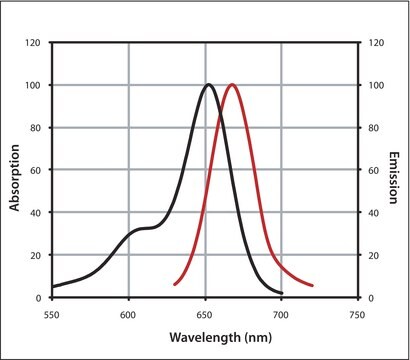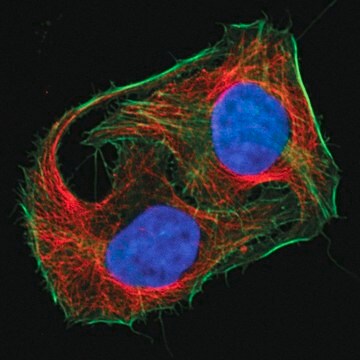343210
FITC Labeling Kit
Sinónimos:
FITC Antibody Labeling Kit, FITC Conjugation Kit, Fluorescent Labeling Kit
About This Item
Productos recomendados
fabricante / nombre comercial
Calbiochem®
Nivel de calidad
condiciones de almacenamiento
OK to freeze
protect from light
temp. de almacenamiento
2-8°C
Descripción general
Componentes
Advertencia
Principio
Nota de preparación
Nota de análisis
2. Using the two absorbance readings, calculate the F/P molar ratio of the FITC/Protein conjugate using the following equation:<div class="Bio_doc_image">Figure 1: F/P Molar Ration
</div>
3. There are 2 equations used for the determination of the concentration of the FITC-antibody conjugate. If the protein used for conjugation was IgG, use the following equation to estimate the concentration of the labeled antibody:<div class="Bio_doc_image"><p class="title">Figure 2: Concentration of FITC-IgG
</div>If the protein conjugated was not IgG, use the following equation to estimate the concentration of conjugated protein:<div class="Bio_doc_image">Figure 3: Concentration of FITC-Protein
</div>Where E0.1% is the A280 reading of a 1 mg/ml solution of the unconjugated protein, as measured in a cuvette of 1 cm path length.
Otras notas
Información legal
Palabra de señalización
Danger
Frases de peligro
Consejos de prudencia
Clasificaciones de peligro
Eye Irrit. 2 - Repr. 1B - Resp. Sens. 1 - Skin Sens. 1
Código de clase de almacenamiento
6.1C - Combustible acute toxic Cat.3 / toxic compounds or compounds which causing chronic effects
Certificados de análisis (COA)
Busque Certificados de análisis (COA) introduciendo el número de lote del producto. Los números de lote se encuentran en la etiqueta del producto después de las palabras «Lot» o «Batch»
¿Ya tiene este producto?
Encuentre la documentación para los productos que ha comprado recientemente en la Biblioteca de documentos.
Nuestro equipo de científicos tiene experiencia en todas las áreas de investigación: Ciencias de la vida, Ciencia de los materiales, Síntesis química, Cromatografía, Analítica y muchas otras.
Póngase en contacto con el Servicio técnico







